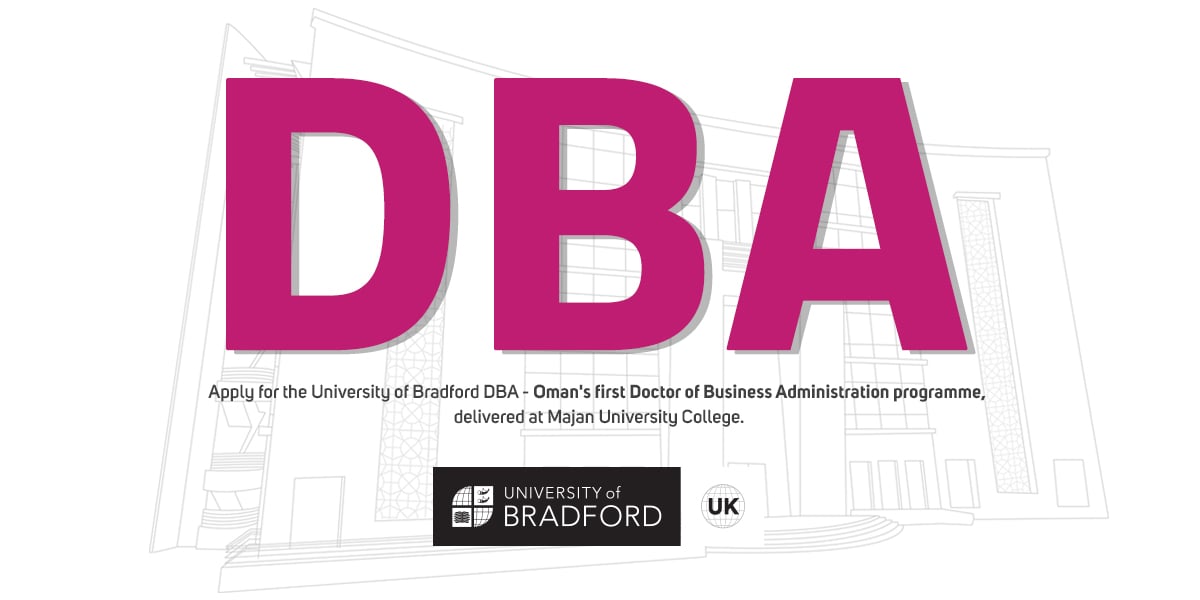Doctor of Business Administration (DBA)

Attendance mode: Part-time | Entry year: 2022 - 2023 | Duration: 4 Years | Start Date: September | Location: Majan University College, Oman
The University of Bradford Doctor of Business Administration (DBA) is the pinnacle of management education.
Professional accreditation
The School of Management of University of Bradford belongs to an elite group of business schools to hold the triple accreditations of Equis, AMBA and AACSB, often referred to as the "Triple Crown".




We welcome applications for the DBA - Oman programme, particularly from applicants whose interests complement the expertise of the Universities Research Centres (People, Organisation and Entrepreneurship; Logistics, Supply Chain and Technology; International Business, Marketing and Branding).
For the DBA, you should have
- a Bachelor's degree and a Master's degree from an accredited institution
- a minimum of five years’ relevant managerial work experience
- a research proposal
- two references (one academic, if possible)
- a minimum score of at least 6.5 on the IELTS test (with no sub-test less than 6.0). TOEFL Test result min 94.
The Research Proposal
This is an important part of your application. Your research proposal will be used to assess the quality and originality of your research ideas, your critical thinking skills, grasp of relevant literature and the feasibility of the proposed research. It will also be used to identify suitable supervisors, so it is certainly worth devoting time and effort to it.
The research proposal should be between 1500 words and 2500 words. While we do not insist on a definite format, we do recommend you to follow the structure outlined below.
Title: the title should be a succinct summary of your proposed research
Introduction: this section should provide a brief description of the subject area in which the research is to be located in, state your central research questions clearly and explain the reasons for proposed research convincingly.
Literature review: this section requires a short review of existing studies (particularly those published in research and practitioner periodicals). You need to explain how your research is being driven by the gaps in the existing literature and comment on how your research could be informed by the existing literature both theoretically and practically. A good literature review should demonstrate how the proposed research is linked with previous studies, establish where its specific contributions could lie and show how the intended specific contributions could be materialised through drawing ideas and strengths from the existing research.
Research methodology: there are a variety of research methods, therefore it is essential that this section provides a clear description of your choice of research methodology (i.e. quantitative or qualitative research) and explain why the chosen one is most suited to your research. This section should also include details of methods of data collection and data analysis and comment on the feasibility of data collection.
Contribution: it is important that DBA research influences and impacts upon both academic theories and concepts, and also business and organisational practices.
Reference: any studies cited in the proposal should be listed at the end of the document using the Harvard style of referencing.
English Language Requirements
The programme is taught, supervised and examined in English, so you must be able to prove your fluency in the language if it is not your first language. You will be required to achieve a minimum score of at least 6.5 on the IELTS test (with no sub-test less than 6.0). TOEFL Test result min 94.
Please note: module information is subject to change.
Modules
Module code: MAL7040-B
Module Aims
- To develop your systematic and critical knowledge of research methods in business and management studies at doctoral level, and build on your experience of research at masters level, and to develop and practise broad-ranging and advanced research skills;
- To enable you to understand the philosophical framework that inform research methods and methodologies facilitating the critical analysis of the assumptions and methods of research;
- To apply advanced understanding of research methodologies in business and management studies more generally.
Module code: MAL7041-B
Module Aims
To develop a comprehensive understanding of qualitative and quantitative research methods, so as to equip you to undertake doctoral level study involving qualitative, quantitative and/or mixed methods research.
Download the PDF for Qualitative and Quantitative Research Methods
Module code: MAL7042-B
Module Aims
- Undertake an advanced search and critically analyse literature on a specific topic in the discipline and assess its contribution to knowledge;
- Organise and synthesise that literature in order to write a critical and detailed review of what is known about that topic;
- Identify gaps in extant knowledge about specific academic and practitioner issues and explain how your doctoral research will contribute to both theory and organisational/management practice.
Download the PDF for Literature Reviewing for Doctoral Studies
Module code: MAL8011-B
Module Aims
This module critically examines how to contribute to developments in business and management studies and impact management/organisation practices.
It aims to help you do that through:
- Developing advanced scholarship skills in writing academic papers for publication;
- Create and interpret new knowledge and empirical research through designing and conducting a pilot study;
- Develop a systematic and critical understanding of the current state of knowledge concerning how to translate research into practice;
- To explore how you will apply advanced knowledge to translating the findings of your own empirical research into management/organisational practice, thus to achieve the core distinction between a DBA and a PhD.
Module code: MAL8012-D
Module Aims
To present and defend an advanced research proposal incorporating an introduction and justification for the study, critical engagement with current research at the forefront of business and management studies, a clear and advanced research methodology, and clear contributions on how this research will create new knowledge, and advance business and management theory and organisational practices
Module code: MAL8013-T
Module Aims
The aim of the thesis research module is to produce managers and leaders who, through advanced scholarship are able to conceptualise, design and implement a research project for the generation of new knowledge at the forefront of business and management studies. You will combine your academic and business expertise, make important contributions to both business and management theory and also organisational and management practices.
Teaching combines academic rigour with practicality and relevance to professionals, executives and managers.
The programme integrates applied and theoretical knowledge and, in particular, facilitates the development of new knowledge which is at the forefront of the discipline and organisational/management practice.
Each module builds on the learning achieved in previous modules, so learning is cumulative, and all modules relate to each other.
You will develop an understanding of the issues of translating research into practice - a fundamental aspect of a DBA. You will be expected to reflect on the key issues you are tackling and explore how such findings, if replicated in a bigger study, could be translated into practice.
In the first year of the Executive DBA, the Director of Studies will be the Personal Academic Tutor for each new cohort of students. Once you pass the first three taught stage modules you will have acquired advanced scholarship and research skills required to create a research proposal. You will work with the DBA Director of Studies on developing your research proposal, and 2 suitable supervisors will be allocated to you, who will become your Personal Academic Tutors.
In the Progression to DBA Research Stage module you will present and defend a detailed 7000-word research proposal, preparing you for the main research stage and ultimately writing a thesis. During the main research phase, you will attend Peer Review Workshops that enhance understanding, provide motivation and support, enable networking, prepare you for presenting your work to non-specialists, give opportunities for the cross-fertilisation of ideas, and will expose you to research from outside your specialist area.
The Programme culminates with the Doctoral thesis of 60,000 words defended at a viva voce examination at University of Bradford, UK.
The Doctor of Business Administration is specifically designed for MBA (or equivalent) graduates who are looking for the next challenge in their careers.
Given that the DBA programme was first launched in 2001 at the University of Bradford School of Management, students and graduates of the DBA programme in Oman will be joining the university's international alumni network of prominent business executives. Current and recent DBA students work for leading multinational companies such as Shell International, Siemens, Coca Cola, Volvo, Bayer, ING Group and Phillips International.


















